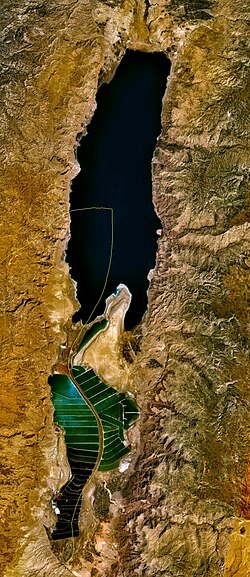 THE DEAD SEA
THE DEAD SEA
The people of Lut rejected (his) warning. We sent against them a violent Tornado with showers of stones, (which destroyed them), except Lut’s household: them We delivered by early Dawn,- As a Grace from Us: thus do We reward those who give thanks. And (Lut) did warn them of Our Punishment, but they disputed about the Warning. (Surat al-Qamar: 33-36 )
Lut lived at the same time as Ibrahim. Lut was sent as a messenger to one of Ibrahim’s neighbouring communities. These people, as the Qur’an tells us, practiced a perversion unknown to the world up to then, namely sodomy. When Lut told them to give up this perversion and brought them Allah’s warning, they denied him, refused his prophethood, and carried on with their perversion. In the end, these people were destroyed by a dreadful disaster.
The city where Lut resided is referred to as Sodom in the Old Testament. Being situated at the north of the Red Sea, this community is understood to have been destroyed just as it is written in the Qur’an. Archaeological studies reveal that the city is located in the area of the Dead Sea which stretches along the Israel-Jordan border.
Before examining the remains of this disaster, let’s see why the people of Lut were punished in this fashion. The Qur’an tells how Lut warned his people and what they said in reply;
The people of Lut rejected the messengers. Behold, their brother Lut said to them: “Will ye not fear (Allah)? I am to you a messenger worthy of all trust. So fear Allah and obey me. No reward do I ask of you for it: my reward is only from the lord of the Worlds. Of all the creatures in the world, will ye approach males, And leave those whom Allah has created for you to be your mates? Nay, ye are a people transgressing (all limits)!” They said: “If thou desist not, O Lut! thou wilt assuredly be cast out!” He said: “I do detest your doings.” (Surat ash-Shuara: 160-168 )
The people of Lut threatened him in response to his inviting them to the right way. His people detested him because of his showing them the right way, and wanted to banish both him and the other believers beside him. In other verses, the event is told as follows;
We also (sent) Lut: He said to his people: “Do ye commit lewdness such as no people in creation (ever) committed before you? For ye practise your lusts on men in preference to women : ye are indeed a people transgressing beyond bounds.” And his people gave no answer but this: they said, “Drive them out of your city: these are indeed men who want to be clean and pure!” (Surat al-Araf: 80-82 )
Lut called his people to an obvious truth and warned them explicitly, but his people did not heed any warnings whatsoever and continued to reject Lut and to deny the penalty of which he told them.
And (remember) Lut: “Behold” he said to his people: “Ye do commit lewdness, such as no people in Creation (ever) committed before you. Do ye indeed approach men, and cut off the highway? And practise wickedness (even) in your councils?” But his people gave no answer but this: they said: “Bring us the Wrath of Allah if thou tellest the truth.” (Surat al-Ankaboot: 28-29 )
Receiving the above answer from his people, Lut asked for the help of Allah,
He said: “O my Lord! help Thou me against people who do mischief!” (Surat al-Ankaboot: 30 )
“O my Lord! deliver me and my family from such things as they do!” (Surat ash-Shuara: 169 )
Upon Lut’s prayer, Allah sent two angels in the form of men. These angels visited Ibrahim before coming to Lut. Giving Ibrahim the good news that his wife would give birth to an infant, the messengers explained the reason of their being sent: the insolent people of Lut were to be destroyed.
(Ibrahim) said: “And what, O ye Messengers, is your errand (now)?” They said, “We have been sent to a people (deep) in sin; To bring on, on them, (a shower of) stones of clay (brimstone), Marked as from thy Lord for those who trespass beyond bounds.” (Surat adh-Dhariyat: 31-34 )
Excepting the adherents of Lut: them we are certainly (charged) to save (from harm) – All – Except his wife, who, We have ascertained, will be among those who will lag behind. (Surat al-Hijr: 59-60 )
After leaving Ibrahim’s company, the angels, who were sent as messengers, came to Lut. Not having met the messengers before, Lut first became anxious, but then calmed down after talking to them;
When Our messengers came to Lut, he was grieved on their account and felt himself powerless (to protect) them. He said: “This is a distressful day.” (Surah Hud: 77 )
He said: “Ye appear to be uncommon folk.” They said: “Yea, we have come to thee to accomplish that of which they doubt. We have brought to thee that which is inevitably due, and assuredly we tell the truth. Then travel by night with thy household, when a portion of the night (yet remains), and do thou bring up the rear: let no one amongst you look back, but pass on whither ye are ordered.” And We made known this decree to him, that the last remnants of those (sinners) should be cut off by the morning. (Surat al-Hijr: 62-66 )
Meanwhile, his people had learned that Lut had visitors. They did not hesitate to approach these visitors perversely as they had approached others before. They encircled the house. Being afraid for his visitors, Lut addressed his people as follows;
Lut said: “These are my guests: disgrace me not: But fear Allah, and shame me not.” (Surat al-Hijr: 68-69 )
The people of Lut retorted;They said: “Did we not forbid thee (to speak) for all and sundry?” (Surat al-Hijr: 70 )
Thinking that he and his visitors subjected to evil treatment, Lut said:
“Would that I had power to suppress you or that I could betake myself to some powerful support.” (Surah Hud: 80 )
His “visitors” reminded him that they were the messengers of Allah and said;
(The Messengers) said: “O Lut! We are Messengers from thy Lord! By no means shall they reach thee! now travel with thy family while yet a part of the night remains, and let not any of you look back: but thy wife (will remain behind): To her will happen what happens to the people. Morning is their time appointed: Is not the morning nigh?” (Surah Hud:81 )
When the perversity of the city people reached its fullest extent, Allah saved Lut by means of the angels. In the morning, his people were destroyed by the disaster of which Lut had informed them in advance.
And they even sought to snatch away his guests from him, but We blinded their eyes. {They heard: } “Now taste ye My Wrath and My Warning.” Early on the morrow an abiding Punishment seized them. (Surat al-Qamar: 37-38 )
The verses describe the destruction of this people as follows;
But the (mighty) Blast overtook them before morning, And We turned (the cities) upside down, and rained down on them brimstones hard as baked clay. Behold! in this are Signs for those who by tokens do understand. And the (cities were) right on the high-road. (Surat al-Hijr: 73-76 )
When Our Decree issued, We turned (the cities) upside down, and rained down on them brimstones hard as baked clay, spread, layer on layer,-Marked as from thy Lord: Nor are they ever far from those who do wrong! (Surah Hud: 82-83 )
But the rest We destroyed utterly. We rained down on them a shower (of brimstone): and evil was the shower on those who were admonished (but heeded not)! : Verily in this is a Sign: but most of them do not believe. And verily thy Lord is He, the Exalted in Might, Most Merciful.(Surat ash-Shuara: 172-175 )
When the people were destroyed, only Lut and the believers, who were only as many as one “household”, were saved. Lut’s wife did not believe either and she was also destroyed.
We also (sent) Lut: He said to his people: “Do ye commit lewdness such as no people in creation (ever) committed before you?
“For ye practise your lusts on men in preference to women : ye are indeed a people transgressing beyond bounds.”
And his people gave no answer but this: they said, “Drive them out of your city: these are indeed men who want to be clean and pure!”
But we saved him and his family, except his wife: she was of those who legged behind.
And we rained down on them a shower (of brimstone): Then see what was the end of those who indulged in sin and crime! (Surat al-Araf: 80-84 )
Thus, Prophet Lut was saved along with the believers and his family with the exception of his wife. As described in the Old Testament, he emigrated with Ibrahim. As for the perverted people, they were destroyed and their dwellings were razed to the ground.







 THE DEAD SEA
THE DEAD SEA















